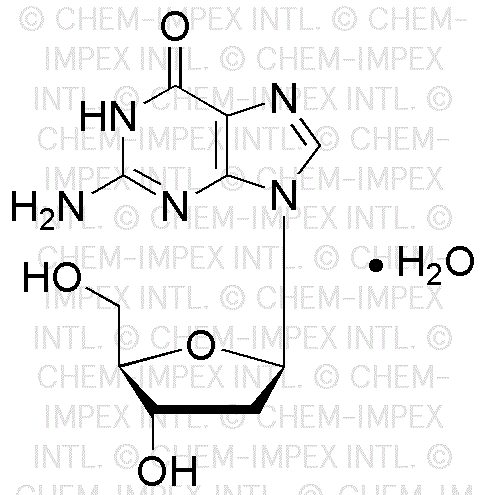2'-Deoxyguanosine monohydrate is widely utilized in research focused on:
- DNA Synthesis: This compound serves as a building block for synthesizing DNA in molecular biology, allowing researchers to create specific DNA sequences for various applications, including gene cloning and synthetic biology.
- Pharmaceutical Development: It plays a crucial role in developing antiviral and anticancer drugs, as it can be modified to create nucleoside analogs that inhibit viral replication or cancer cell growth.
- Biochemical Research: Used in studies related to nucleic acid metabolism, it helps scientists understand the biochemical pathways involved in DNA replication and repair, which is essential for genetic research.
- Diagnostic Tools: The compound is utilized in the development of diagnostic assays for detecting genetic disorders, providing a means for early diagnosis and personalized medicine.
- Gene Therapy: It is being explored in gene therapy applications, where modified versions can deliver therapeutic genes to target cells, offering potential treatments for genetic diseases.
Información general
Propiedades
Seguridad y normativas
Aplicaciones
2'-Deoxyguanosine monohydrate is widely utilized in research focused on:
- DNA Synthesis: This compound serves as a building block for synthesizing DNA in molecular biology, allowing researchers to create specific DNA sequences for various applications, including gene cloning and synthetic biology.
- Pharmaceutical Development: It plays a crucial role in developing antiviral and anticancer drugs, as it can be modified to create nucleoside analogs that inhibit viral replication or cancer cell growth.
- Biochemical Research: Used in studies related to nucleic acid metabolism, it helps scientists understand the biochemical pathways involved in DNA replication and repair, which is essential for genetic research.
- Diagnostic Tools: The compound is utilized in the development of diagnostic assays for detecting genetic disorders, providing a means for early diagnosis and personalized medicine.
- Gene Therapy: It is being explored in gene therapy applications, where modified versions can deliver therapeutic genes to target cells, offering potential treatments for genetic diseases.
Documentos
Hojas de datos de seguridad (HDS)
La SDS proporciona información de seguridad completa sobre la manipulación, el almacenamiento y la eliminación del producto.
Especificación del producto (PS)
La PS proporciona un desglose completo de las propiedades del producto, incluida la composición química, el estado físico, la pureza y los requisitos de almacenamiento. También detalla los rangos de calidad aceptables y las aplicaciones previstas del producto.
Certificados de análisis (COA)
Busque certificados de análisis (COA) ingresando el número de lote del producto. Los números de lote y de partida se pueden encontrar en la etiqueta de un producto después de las palabras "Lote" o "Lote".
Número de catálogo
Número de lote/lote
Certificados de origen (COO)
Este certificado de origen confirma el país en el que se fabricó el producto y también detalla los materiales y componentes utilizados en él y si se deriva de fuentes naturales, sintéticas u otras fuentes específicas. Este certificado puede ser necesario para cumplir con las normativas aduaneras, comerciales y regulatorias.
Número de catálogo
Número de lote/lote
Hojas de datos de seguridad (HDS)
La SDS proporciona información de seguridad completa sobre la manipulación, el almacenamiento y la eliminación del producto.
DownloadEspecificación del producto (PS)
La PS proporciona un desglose completo de las propiedades del producto, incluida la composición química, el estado físico, la pureza y los requisitos de almacenamiento. También detalla los rangos de calidad aceptables y las aplicaciones previstas del producto.
DownloadCertificados de análisis (COA)
Busque certificados de análisis (COA) ingresando el número de lote del producto. Los números de lote y de partida se pueden encontrar en la etiqueta de un producto después de las palabras "Lote" o "Lote".
Número de catálogo
Número de lote/lote
Certificados de origen (COO)
Este certificado de origen confirma el país en el que se fabricó el producto y también detalla los materiales y componentes utilizados en él y si se deriva de fuentes naturales, sintéticas u otras fuentes específicas. Este certificado puede ser necesario para cumplir con las normativas aduaneras, comerciales y regulatorias.


